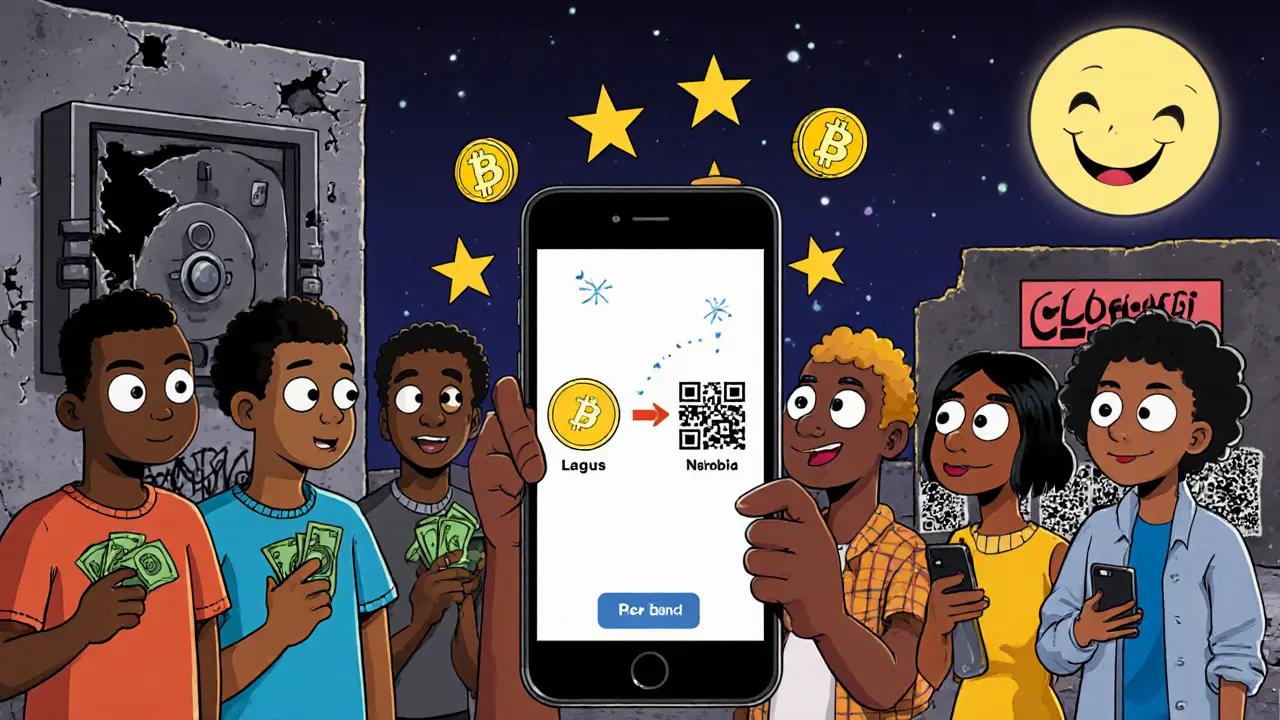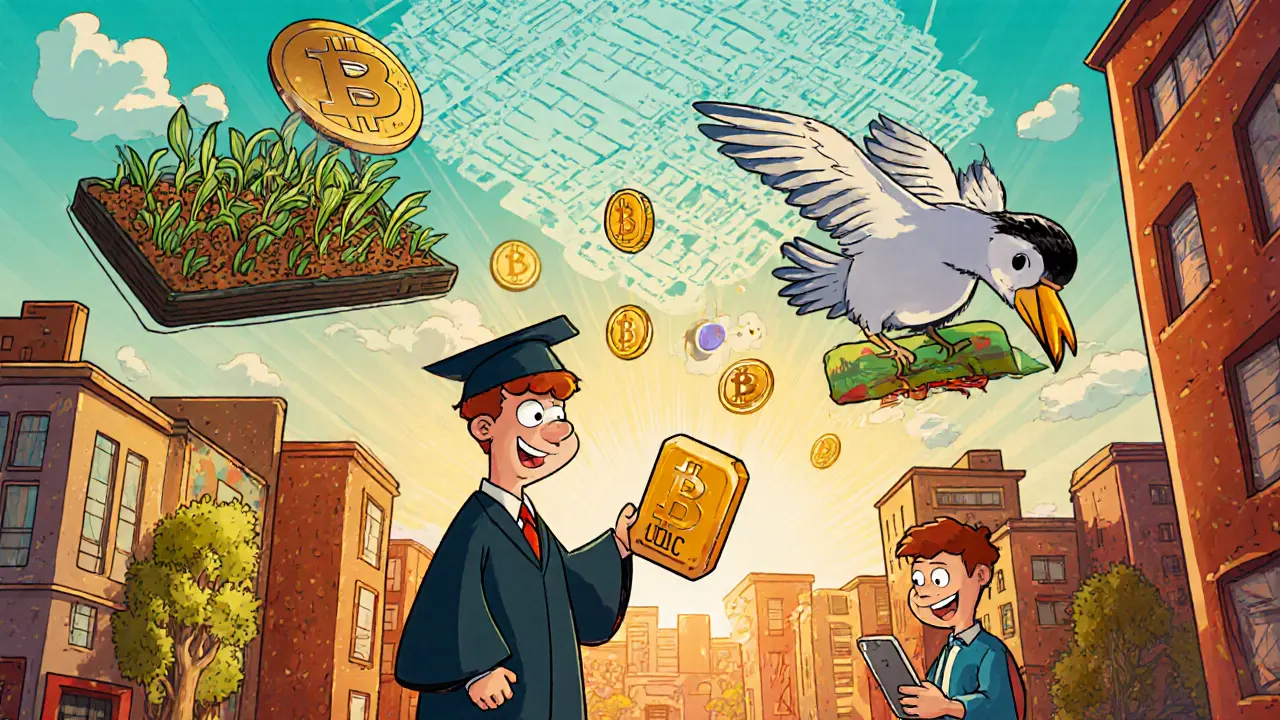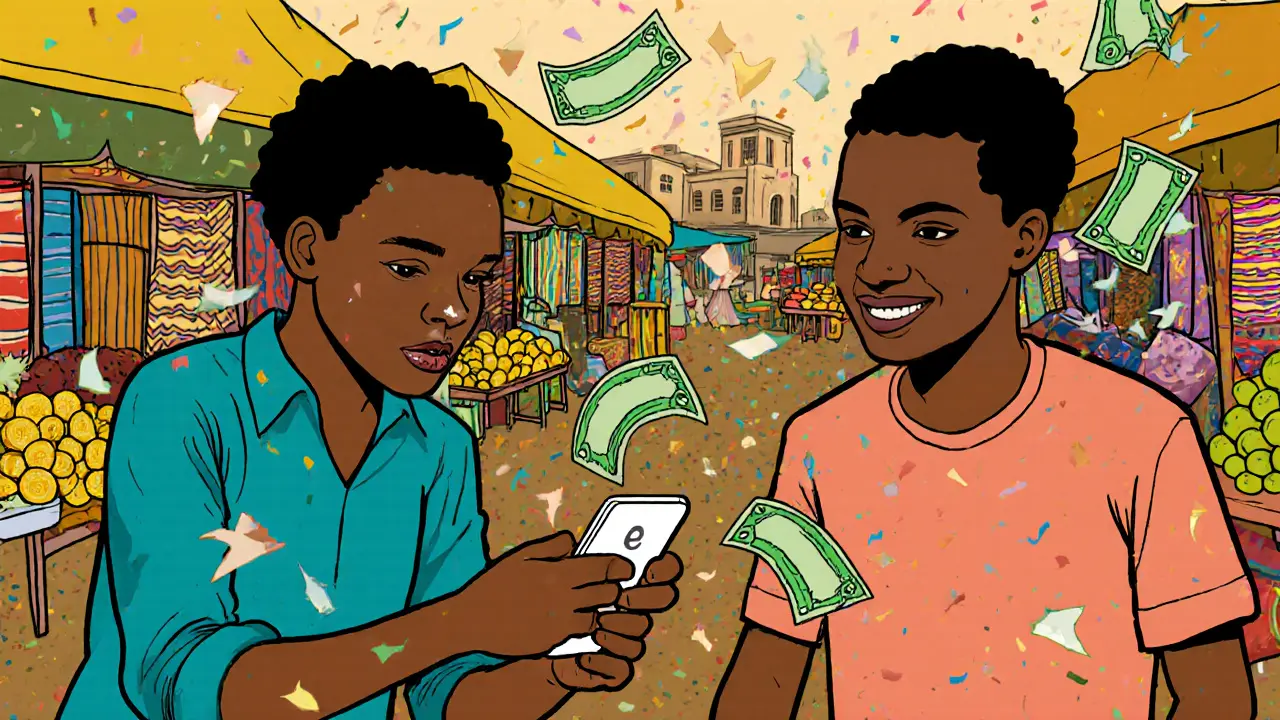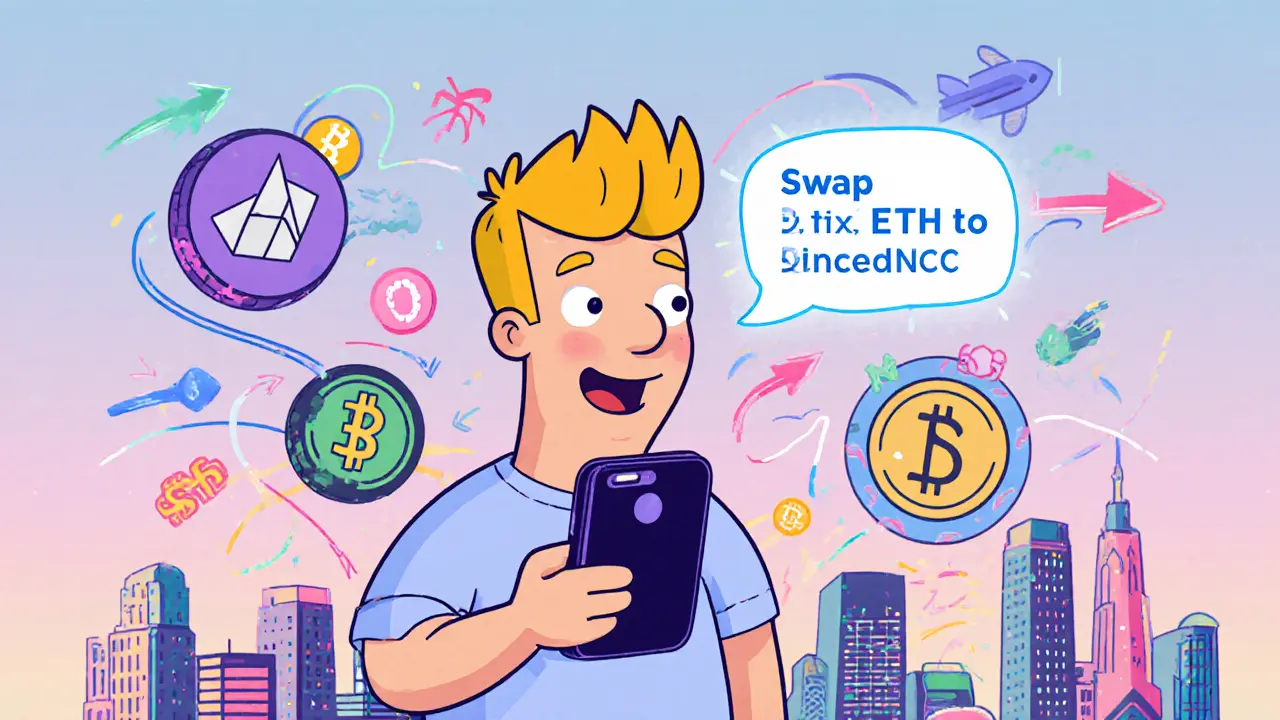Currency Value Calculator
Real-World Value Calculator
See how much your money is worth in countries with unstable currencies. Based on Nigeria's 2023 data where 1 USD = 1,500 Naira.
Your Money's Real Value
Remittance Cost Comparison
Traditional banks charge 8% fees for sending $100 internationally.
Crypto fees cost less than $2 for the same transaction.
Potential savings: $78When a country’s money loses 75% of its value in less than a decade, people don’t wait for permission to find a solution. In Nigeria, they turned to cryptocurrency-not because it was trendy, but because their savings were disappearing faster than they could earn them. The government tried to ban it. Banks blocked transactions. Yet crypto usage didn’t just survive-it exploded. Today, Nigeria ranks second in the world for crypto adoption, even after multiple crackdowns. This isn’t an anomaly. It’s a pattern repeating across the Global South, where people are building their own financial systems, one peer-to-peer transaction at a time.
Why People Risk It
In Nigeria, inflation hit 24% in 2023. The naira, once worth 150 to the US dollar, now trades near 1,500. That’s not just a number-it means your salary buys less than a quarter of what it did five years ago. Many people can’t access foreign currency legally. Remittances from family abroad cost up to 8% in fees through traditional channels. For someone sending $200 home, that’s $16 gone. Crypto cuts that to under $2. No middlemen. No delays. No permission slips. It’s not just Nigeria. In Argentina, where inflation hit 280% in 2024, people use Bitcoin to protect their wages. In Vietnam, young workers use stablecoins to save for college, bypassing banks that charge high fees for small accounts. In Ghana and Kenya, mobile money users are switching to crypto to send money across borders without waiting days for clearance. These aren’t speculators. They’re everyday people using crypto as a survival tool.How It Works Without Banks
You won’t find crypto ATMs in most of these places. You won’t see ads from Coinbase or Binance. Instead, adoption spreads through WhatsApp groups, Telegram channels, and local market stalls. A vendor in Lagos might accept USDT (Tether) because it holds value better than naira. A student in Buenos Aires buys Bitcoin through a peer-to-peer app like Paxful, then sells it slowly to pay rent. No ID required. No bank account needed. Just a smartphone and a Wi-Fi signal. The infrastructure isn’t perfect. Internet outages happen. Prices swing. But the trade-off is clear: crypto is more reliable than the local currency. In 2023, Nigeria’s central bank blocked banks from handling crypto transactions. Within weeks, people started using decentralized exchanges and peer-to-peer platforms like LocalBitcoins and Binance P2P. Transactions moved to cash meetups, digital wallets, and even QR codes on posters. The government could shut down banks-but it couldn’t shut down people’s need to store value.The Role of Youth and Technology
Nigeria has one of the youngest populations in the world. Over 60% of its 210 million people are under 30. They grew up with smartphones. They don’t trust institutions that failed them. They don’t want to wait for a bank to approve a loan. They want control. This generation uses crypto not just to send money, but to access global markets. A designer in Abuja sells NFT art to buyers in the US. A coder in Kano builds DeFi tools on Ethereum and gets paid in USDC. A farmer in Port Harcourt uses a crypto-based microloan app to buy seeds, then repays in stablecoins after harvest. These aren’t fringe activities. They’re becoming normal. Smartphone penetration in Nigeria is over 50%. In Kenya, it’s 80%. In India, where crypto is heavily taxed but not banned, over 100 million people now hold digital assets. The tools are simple: apps like Trust Wallet, Phantom, or MetaMask. No paperwork. No credit check. Just a seed phrase you write down and protect.
Government Bans Don’t Work-They Just Drive It Underground
Nigeria’s central bank issued a ban in 2021. It threatened banks with penalties if they processed crypto transactions. The result? Crypto usage jumped 1,200% in the next year. People didn’t stop using it-they got smarter. They used cash exchanges. They traded through friends. They used VPNs to access foreign exchanges. The ban didn’t stop adoption. It made it more decentralized, more resilient. The same thing happened in Venezuela. After the government cracked down on Bitcoin in 2019, usage didn’t drop-it diversified. People started using crypto to buy food, pay for medicine, and even rent apartments. In Iran, where international banking is cut off, crypto is used to import goods and pay for online services. In Turkey, where the lira lost 40% of its value in 2023, crypto became the go-to savings tool for middle-class families. Bans work only if people have no alternatives. When the alternative is losing everything, people choose crypto-not because they love blockchain, but because they have no other choice.The Shift in Global Policy
Governments are starting to realize they can’t win this fight. In 2025, the US passed the GENIUS Act, a bipartisan law that created clear rules for stablecoins. It didn’t ban crypto. It regulated it. The same year, the Trump administration issued an executive order stating it was policy to “support the responsible growth and use of digital assets.” Even the SEC, once seen as crypto’s biggest enemy, paused lawsuits against major exchanges. This isn’t a sudden change. It’s a reaction. When millions of people use a technology daily, governments have to respond-not by banning it, but by managing it. Nigeria’s government, after years of resistance, quietly began allowing licensed crypto exchanges to operate in 2024. They didn’t cheer. They didn’t celebrate. But they stopped trying to shut it down. The lesson is clear: you can’t stop grassroots adoption. You can only try to control it. And when you do, you risk pushing it further into the shadows.
What This Means for the Future
This isn’t just about money. It’s about autonomy. People in countries with broken financial systems are building their own. They’re not waiting for the IMF or the World Bank to fix things. They’re using code, networks, and trustless systems to take control. In the next five years, we’ll see more countries follow Nigeria’s path. India, Indonesia, Egypt, and Brazil are already showing signs of similar behavior. As inflation rises and banking access stays limited, crypto will keep growing-not because it’s perfect, but because it’s better than the alternative. The real question isn’t whether governments will ban crypto. It’s whether they’ll recognize that the people using it aren’t criminals. They’re customers. They’re workers. They’re parents trying to feed their kids. And when you have that many people on one side, the rules change.What Comes Next
Crypto won’t replace banks overnight. But it’s already replacing the parts of banking that failed people. No more 3-day wire transfers. No more 10% remittance fees. No more frozen accounts. No more currency collapses wiping out savings. The future of finance isn’t in Wall Street boardrooms. It’s in the hands of a student in Lagos buying USDT with cash from a market vendor. It’s in a mother in Buenos Aires using Bitcoin to pay her daughter’s school fees. It’s in a freelancer in Nairobi getting paid in USDC instead of waiting for a bank to clear a check. These aren’t outliers. They’re the new normal.Why do people use crypto when their government bans it?
People use crypto when their government bans it because they have no other way to protect their money. In countries with high inflation, unstable currencies, or blocked access to foreign money, crypto offers a way to save, send, and spend without relying on broken systems. It’s not about ideology-it’s about survival.
Is crypto legal in Nigeria?
Nigeria banned banks from processing crypto transactions in 2021, but it never made owning or trading crypto illegal for individuals. By 2024, the government began licensing exchanges and allowing regulated platforms to operate. While there’s still no formal legal framework, enforcement has shifted from blocking to managing.
Can crypto replace traditional banking in developing countries?
Crypto won’t replace all banking functions, but it’s already replacing the most broken parts: cross-border payments, savings protection, and access to global markets. For millions without bank accounts, crypto offers a faster, cheaper, and more reliable alternative. It’s not perfect, but it’s often the only option left.
How do people buy crypto without a bank account?
People buy crypto through peer-to-peer platforms like Paxful, LocalBitcoins, or Binance P2P. They meet sellers in person, pay in cash, and receive crypto directly to their wallet. Others use mobile money services like M-Pesa to trade for crypto. No bank needed-just a phone and trust in the person they’re trading with.
Why did the U.S. change its stance on crypto in 2025?
The U.S. changed its stance because crypto adoption became too big to ignore. Millions of Americans hold digital assets, and global competition forced policymakers to act. The GENIUS Act and executive order in 2025 weren’t about promoting crypto-they were about controlling it. When regulation fails, governments shift from banning to governing.
Is crypto safe for everyday people in unstable economies?
It’s not risk-free. Prices can swing, scams exist, and losing your seed phrase means losing everything. But for many, the risk of holding devaluing currency is worse. Crypto isn’t a magic fix-but in places where the system has failed, it’s often the least bad option available.


Michael Brooks
November 11, 2025 AT 12:39Crypto isn't some radical experiment-it's just what happens when people stop trusting broken systems. In Nigeria, it's not about Bitcoin hype. It's about feeding your family when your salary evaporates by Thursday. The banks didn't fail them. The system did. And now, people are building something better with just a phone and a Wi-Fi signal.
It's not perfect. But neither is the naira.
Ruby Gilmartin
November 12, 2025 AT 10:07Let’s be real-this isn’t grassroots adoption. It’s desperation dressed up as innovation. You call it survival, but it’s just financial anarchy with a blockchain veneer. The fact that people are trading cash for USDT in parking lots doesn’t mean it’s sustainable. It means the state has collapsed, and they’re patching it with crypto duct tape.
And don’t get me started on ‘peer-to-peer trust.’ Half of those transactions are scams. The other half are money laundering fronts. You’re romanticizing chaos.
James Ragin
November 12, 2025 AT 20:31Interesting how the West now pretends to admire this ‘resilience’ while simultaneously sanctioning every emerging economy that dares to bypass the dollar hegemony. Nigeria isn’t adopting crypto-they’re rejecting the IMF’s stranglehold. And yes, the U.S. government just passed the GENIUS Act because they realized they can’t control what they can’t see.
But don’t mistake this for liberation. The same Wall Street firms that crushed Zimbabwe’s economy are now launching stablecoin ETFs. Crypto isn’t the revolution-it’s the rebranding of colonial finance.
They’ll tax it, regulate it, and then call it ‘responsible innovation’-all while keeping the power in their hands. The people win nothing. Only the middlemen change their logos.
Douglas Tofoli
November 14, 2025 AT 07:58bro this is wild but also kinda beautiful 🤯
i had a friend in kenya who paid his sister’s tuition with usdc through m-pesa-no bank, no waiting, no fees. just a qr code and a handshake. the system is broken but people are hacking it with code. that’s not chaos, that’s ingenuity.
also why is everyone so scared of decentralization? it’s not about replacing banks-it’s about giving people back control. we’re not talking about rich investors here. we’re talking about moms, students, farmers. they’re not speculating. they’re surviving.
and yes i know crypto is volatile but honestly? the naira is worse. at least with usdt you can see the value.
ps. if you’re still using western union for remittances you’re literally throwing money away 💸
Elizabeth Stavitzke
November 15, 2025 AT 22:26Oh wow, look at these brave little rebels trading crypto in Lagos while the West sleeps. How quaint. Let me grab my monocle and weep for the poor Africans who don’t have access to Chase Bank.
Meanwhile, in the real world, the U.S. government didn’t ‘change its stance’-it realized crypto’s value as a tax base and a surveillance tool. The GENIUS Act isn’t liberation-it’s licensing. You think people in Nigeria are free? They’re just trading in a new cage-one with blockchain analytics and KYC compliance.
Stop romanticizing poverty. This isn’t a revolution. It’s a bailout for the crypto industry.
William Moylan
November 16, 2025 AT 13:32you think this is about survival? think again. the feds let this happen on purpose. they need people to use crypto so they can track every single transaction. every wallet, every address, every qr code scan-it’s all logged. the central bank banned it? nah. they just moved it underground so they could monitor it better.
they want you to think you’re free but you’re just feeding the surveillance state. your ‘stablecoin’? it’s a tracking chip with a blockchain label. they’re building a digital ID system through the backdoor and you’re handing them your seed phrase like it’s a loyalty card.
and don’t tell me ‘no one’s watching’-the same people who ran the fed are now advising the SEC. they’ve been planning this for a decade.
you think you’re escaping the system? you’re becoming it.
Brian Gillespie
November 17, 2025 AT 09:26Just saw a video of a guy in Accra buying rice with USDT. No bank. No app. Just a phone and a QR code on a cardboard sign.
That’s the future. Simple. Direct. Human.
Andy Purvis
November 17, 2025 AT 10:19There’s something really powerful here that gets lost in all the noise. It’s not about the tech. It’s about dignity. When your money loses value every day, and the people in charge don’t care-you find a way. Not because you love blockchain, but because you refuse to be powerless.
People aren’t trying to overthrow governments. They’re just trying to feed their kids. And for once, the system didn’t stop them.
Maybe that’s the real innovation. Not the code. The courage.
Michael Faggard
November 18, 2025 AT 07:29From a protocol standpoint, what’s fascinating is the emergent layer-2 infrastructure: cash-backed P2P liquidity pools, offline QR-based settlement protocols, and hybrid mobile-money-to-crypto bridges like M-Pesa → USDT via agent networks. This isn’t just adoption-it’s organic financial infrastructure development bypassing legacy SWIFT and correspondent banking entirely.
The real disruptor isn’t Bitcoin-it’s the absence of intermediaries. No KYC. No AML gatekeepers. No reserve requirements. Just trustless value transfer via decentralized networks. That’s the paradigm shift. Central banks can’t regulate what they can’t touch.
And yes, volatility is a problem-but in hyperinflationary environments, even 20% swings are preferable to 50% monthly devaluation. The risk calculus has fundamentally changed.
Ainsley Ross
November 19, 2025 AT 11:43I’ve lived in three countries where the currency collapsed. I’ve seen people trade gold, cigarettes, even chickens for bread. Crypto isn’t magic-but it’s the first time in history that the powerless have had a tool that’s global, instant, and untouchable by a single government.
It’s not perfect. But neither was the barter system. And yet, we survived.
What’s happening in Nigeria, Kenya, Argentina-it’s not rebellion. It’s evolution. And if you’re not listening, you’re not just out of touch. You’re blind.
Let them build. We should be helping, not judging.
David Billesbach
November 20, 2025 AT 10:38You’re all delusional. This isn’t empowerment-it’s a trap laid by the globalist elite to dismantle sovereign monetary systems. The same people pushing crypto are the ones who designed the IMF’s structural adjustment programs that destroyed African economies in the first place.
They don’t want you to have gold or cash. They want you to have digital tokens that can be frozen, taxed, or blacklisted with a single click. The blockchain isn’t decentralized-it’s a honeypot. Every wallet is a data point. Every transaction is a breadcrumb.
And don’t tell me about ‘no ID required.’ The moment you use Binance P2P, you’re already giving them your IP, your phone number, your device ID. They don’t need your passport-they have your fingerprint.
This isn’t freedom. It’s digital serfdom with a crypto logo.
FRANCIS JOHNSON
November 22, 2025 AT 02:53My dad sent $300 to my sister in Lagos last month. Used Paxful. Paid $2.50. Took 12 minutes.
Western Union would’ve taken 3 days and $24.
He didn’t know what a blockchain was.
He just wanted her to have her money.